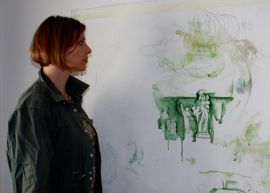EMMA LOUISE PRATT
VOID, GOD & ATOM
6 –23 August 2019
Preview: Tuesday 6 August, 5pm
Artist Talk: Thursday 8 August, 12noon
Uprooted
After so many years in a dusty, built-up city southern European city, I now live on the outskirts of Cambridge, UK. I walk a lot in the woods near my home by the river Cam. It’s a very simple walk in a green belt by Grantchester, hemmed in by the M11 and the sprawl of new housing that booming Cambridge desperately needs.
These are the ancient islands of Anglos, Saxons, Celts and Picts -the islands of my own ancestors. If you were to ask me where I come from, my passport says New Zealand. But my DNA is all north of Sheffield and North Wales out to the farthest islands of Scotland. I’m both from here and not. Like a dancing atom.
In Cambridge, I live among one of the most international communities I’ve ever known. They are trying to understand everything. They investigate dark matter and map neurons of a fly. They control masses of data. We will never stop wanting to understand these particles and spaces and combining glues. We are we from? Of what are we made? How does everything work? Why?
Human, as a word, comes from the Latin root “humanus”. This word comes from “humus” which means “cultivated from the dirt”.
A pervading binary view of earth versus sky has meant that Proto-Indo-Europeans (PIE) had a word to describe the “not from or of the earth”: dyew or deywóes. In Sanskrit deva, in Welsh duw, Irish dia and Latvian dievs. In Latin we had deus, which in Romantic languages survives today is French dieu, Spanish dios, Portuguese and Galician deus, Italian dio…
The ancient Greek word Theos (Θεός) is drawn from a different idea. Not location, but action. It’s believed to have its roots in the PIE root word dhēs-. This word formed the base of religious concepts and to my understanding, refers to an ability to set in place or put or make – which I then see as referring to the being or entity as the setter, or maker…or creator. We get words like: atheism, monotheism, polytheism, theology, enthusiasm, fest…
We are beings made of the earth and dirt, the created. To inhume us is to send us back to it, to bury us in the earth from whence we came. Dust to dust.
In the late 18th and throughout 19th century, my ancestors became part of a diaspora. What was carried to New Zealand with my family? What was handed down? What was lost when we got torn up from the earth that had raised us?
- For the full essay see here.
Emma Louise Pratt studied at Ilam School of Fine Art, Canterbury University, New Zealand. She has been the runner up in the Molly Morpeth Canaday Award (2005), finalist in the Norsewear Award (2007) in New Zealand, finalist in the Focus Abengoa International Painting Prize, Spain (2014) and finalist in the Parkin Drawing Prize (2019).












